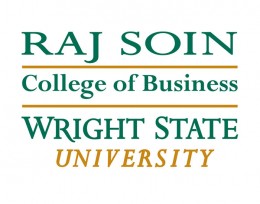Excerpt
 Two Wright State University graduates have launched a new Dayton-area marketing agency that operates on a virtual network.
Two Wright State University graduates have launched a new Dayton-area marketing agency that operates on a virtual network.
Lion + Panda’s co-founders said their lack of a physical headquarters, and use of freelance creative talent via an online network, reduces overhead, saves clients money and allows them to easily reach out to other markets such as Columbus and Cincinnati.
The agency was started about three months ago by Richard Kaiser and Philip Roestamadji, who both earned marketing degrees at Wright State. Kaiser, a Celina native, is a veteran of local agencies that include Graphica, Atomic Interactive and the Ohlmann Group. Roestamadji, who grew up in the Greenville area, has worked for such companies as GE and WorkflowOne.
Lion + Panda, which has 12 area companies as clients, is a “hybrid agency” that uses traditional marketing and ties it in with a digital base, Roestamadji said. The firm hosted a launch party Saturday to introduce new and prospective clients to its creative team.
U.S. spending in major media advertising and marketing services for 2014 is projected to reach $390 billion, a 3.2 percent increase from last year, according to global media network ZenithOptimedia.
In 2012, the Internet became the nation’s second-largest advertising medium after television. ZenithOptimedia expects the Internet to account for 24.6 percent of U.S. ad spending in 2014, and 30.7 percent in 2016, up from 6 percent in 2005.
Kaiser said much of traditional marketing is effective when the client needs to get a message out to a huge audience and has the budget to do so. However, smaller startup companies need to be strategic with their dollars, so Lion + Panda looks for the best use of those resources, he said.
Typically, that starts with a website, but then extends to inbound marketing, which involves digital tools such as blogs, social media and search engine optimization. Once those pieces are in place, the agency looks at more traditional methods such as television, radio and print advertising, or direct mail pieces.
“It is figuring out who is their target market and where are they consuming media, and how do we get in front of them with the right message,” Kaiser said.
Scratch Event Catering has benefited from Lion + Panda’s services, said Matthew Hayden, the company’s executive chef and owner, and a 20-year veteran of the Dayton-area restaurant industry. Kaiser and Roestamadji’s work for his company pre-dates the agency’s founding and includes Scratch’s website, branding and image, as well as Hayden’s behavior with clients, he said.
“Within a year of dealing with them I am in the top of a lot of search categories on Google, which has yielded the most results of any marketing I’ve done to date,” Hayden said. “They are steering traffic to me and to my website successfully.”
Lion + Panda operates on a virtual network, without a central office location and the associated expenses. Instead, Kaiser and Roestamadji meet with clients at their own offices, or at restaurants, coffee shops or bars.
“We really believe in this model because it allows us to do what we do with low overhead,” Roestamadji said.
Lion + Panda uses a staff of 10 to 12 freelance creative professionals who work for the agency either full- or part-time. In addition, the firm can create a customized team by using a network of more than 300 people with specialized skills such as illustration, mobile application development or motion graphics, on an as-needed basis.
“They are virtual, so they’re lean and they’re mean, and they have this huge pool of people that are also virtual,” Hayden said. He said he works with five to seven people from the agency whom he has never met in an office, because much of it is done online.
Kaiser and Roestamadji focus on project management, client relations, strategy and negotiations, which allows the creative staff to focus on their work. The freelancers indicate their availability, and the agency’s principals fill their dockets with schedules and project work.
Lion + Panda’s goal is to create something that is good for the client, rather than trying to fit the client into the agency’s mold. That means finding the right talent for the job via the virtual network, Roestamadji said.
“We are not trying to do anything that is cookie-cutter here. We are trying to do something that is very custom, building around the companies that we work with,” he said.
Kaiser said the agency plans to grow by focusing on data analytics and return on investment.
“I want these guys seeing reports back and knowing that what we are doing is generating income for them,” he said. “I don’t want to just sell them a project and walk away.”
Read the original post at DaytonDailyNews.com

 Walking through open doors
Walking through open doors  Adventures await
Adventures await  Wright State to expand nursing facilities to meet workforce needs and prepare more graduates for in-demand careers
Wright State to expand nursing facilities to meet workforce needs and prepare more graduates for in-demand careers  Wright State student-athletes make a lasting impact on local family with more to come
Wright State student-athletes make a lasting impact on local family with more to come  Wright State names Rajneesh Suri dean of Raj Soin College of Business
Wright State names Rajneesh Suri dean of Raj Soin College of Business 